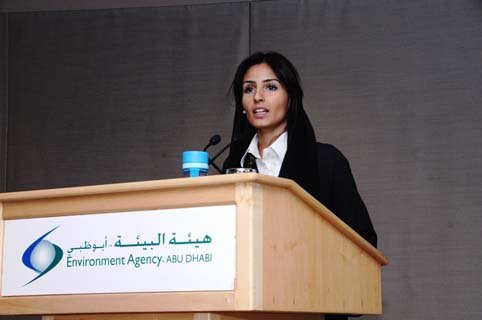ID :
346245
Thu, 10/30/2014 - 08:45
Auther :
Shortlink :
https://oananews.org//node/346245
The shortlink copeid
EAD Secretary-General praises country's wise leadership for U.A.E. Vision 2021

Abu Dhabi (WAM): The U.A.E.'s wise leadership has helped place the country on a sustainability trajectory with the introduction of the U.A.E. Vision 2021, which is based on accommodating its future population trends, ranging from economic and social to environmental targets, a top official of Environment Agency-Abu Dhabi, EAD, said.
Razan Khalifa Al Mubarak, Secretary-General of EAD, delivering a lecture at the Masdar Institute of Science and Technology campus entitled: ‘Sustainable growth – achieving the vision’, said, "In line with the leadership’s vision in providing our citizens and residents with a sustainable and brighter future, we must dedicate ourselves to making this vision a reality." Al Mubarak was earlier received by Dr. Fred Moavenzadeh, President, Masdar Institute, and was introduced to the audience by Dr. Lamya Fawwaz, Executive Director, Public Affairs, Masdar Institute.
The lecture, which was organised under the Distinguished Lecture Series, was attended by students, faculty and staff members from Masdar Institute and other universities. A number of key government, non-government and private sector stakeholders were present at the event.
Razan Khalifa Al Mubarak added, "It is imperative that we emphasise and highlight the importance of sustainable growth to the next generation. For it is our youths who will carry on, lead, implement and contribute to the success of green and sustainable strategies and the growth outlined in Abu Dhabi vision." In her lecture, she highlighted the importance of building sustainable cities for a greener future, as the world faces limited natural resources, rising costs, and dangerous levels of emissions and pollution attributed to consumption.
"With a current global population of seven billion, we require the equivalent of 1.5 planets to sustain our lifestyle, especially as some of our resources are renewable and can recover if we reduce or stop withdrawals, while other resources are non-renewable. The world is facing insurmountable environmental issues that must be tackled in order to sustain forecasted population growth to 9.5 billion by 2050 where, if our consumption follows the current trend, we will require 3 planets to sustain our way of life." "With predictions that almost 60% of the current population will be living in urban areas by 2030, meaning that rapid urbanisation will be placing a heavy burden on our natural resources and exerting pressure on the general public’s health, is a testament to the importance of building sustainable cities," she added.
"In line with U.A.E. Vision 2021, Abu Dhabi Emirate developed the Abu Dhabi Economic Vision 2030, complemented by the Environment Vision 2030 which both will complement and support the planned economic growth of the country through viable and environmentally sustainable methods." She noted the government’s recognition of several obstacles it must overcome and has already began placing initiatives in place. "The U.A.E.’s high usage of electricity and water, which is due partly to its climate, has led to the necessity of diversifying our energy mix. By 2021, the U.A.E. aims to reduce its energy mix consumption by utilising renewable resources and implementing sustainable building codes which have already been taken into effect through Estidama." Al Mubarak concluded by saying, "It is people who live and work in our cities and it is people who make the hearts of our cities beat. It is therefore imperative that we give communities, families, and young people a voice as we decide how to create our future sustainable and smart cities." – Emirates News Agency, WAM – http://www.wam.ae/en/news/emirates/1395271604778.html





